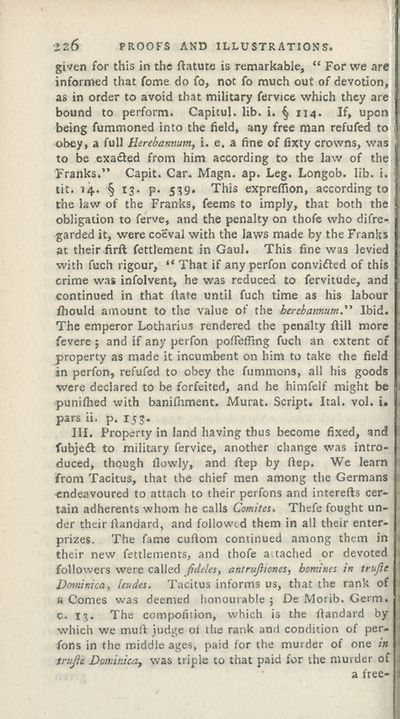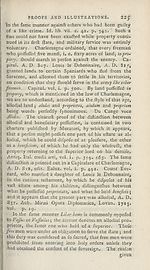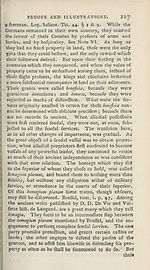Download files
Complete book:
Individual page:
Thumbnail gallery: Grid view | List view

PROOFS AND ILLUSTRATIONS.
iz6
given for this in the ftatute is remarkable, “ For we are
informed that fome do fo, not fo much out of devotion,
as in order to avoid that military fervice which they are
bound to perform. Capitul. lib. i. § 114. If, upon
being fummoned into the field, any free man refufed to
obey, a full Herebarmum, i. e. a fine of fixty crowns, was
to be exacted from him according to the law of the
Franks.” Capit. Car. Magn. ap. Leg. Longob. lib. i.
tit. 14. § 13. p. 539. This exprelfion, according to
the law of the Franks, feems to imply, that both the
obligation to ferve, and the penalty on thofe who difre-
garded it, were coeval with the laws made by the Franks
at their firft fettlement in Gaul. This fine was levied
with fuch rigour, “ That if any perfon convifted of this
crime was infolvent, he was reduced to fervitude, and
continued in that Hate until fuch time as his labour
fhould amount to the value of the berebamum." Ibid.
The emperor Lotharius rendered the penalty Hill more
fevere ; and if any perfon pofTeffing fuch an extent of
property as made it incumbent on him to take the field
in perfon, refufed to obey the fummons, all his goods
were declared to be forfeited, and he himfelf might be
punifhed with baniihment. Murat. Script. Ital. vol. i.
pars ii. p. 153.
III. Property in land having thus become fixed, and
lubjedt to military fervice, another change was intro¬
duced, though flowly, and flep by Hep. We learn
from Tacitus, that the chief men among the Germans
endeavoured to attach to their perfons and interefts cer¬
tain adherents whom he calls Comites. Thefe fought un¬
der their ftandard, and followed them in all their enter-
prizes. The fame cuftom continued among them in
their new fettlements, and thofe a tached or devoted
followers were called f deles, antrujhones, homines in trufte
Dotninica, leudes. Tacitus informs us, that the rank of
a Comes was deemed honourable ; De Morib. Germ,
c. 13. The compolition, which is the llandard by
which we muft judge ot the rank and condition of per¬
fons in the middle ages, paid for the murder of one in
trujie Dominica, was triple to that paid for the murder of
a free-
iz6
given for this in the ftatute is remarkable, “ For we are
informed that fome do fo, not fo much out of devotion,
as in order to avoid that military fervice which they are
bound to perform. Capitul. lib. i. § 114. If, upon
being fummoned into the field, any free man refufed to
obey, a full Herebarmum, i. e. a fine of fixty crowns, was
to be exacted from him according to the law of the
Franks.” Capit. Car. Magn. ap. Leg. Longob. lib. i.
tit. 14. § 13. p. 539. This exprelfion, according to
the law of the Franks, feems to imply, that both the
obligation to ferve, and the penalty on thofe who difre-
garded it, were coeval with the laws made by the Franks
at their firft fettlement in Gaul. This fine was levied
with fuch rigour, “ That if any perfon convifted of this
crime was infolvent, he was reduced to fervitude, and
continued in that Hate until fuch time as his labour
fhould amount to the value of the berebamum." Ibid.
The emperor Lotharius rendered the penalty Hill more
fevere ; and if any perfon pofTeffing fuch an extent of
property as made it incumbent on him to take the field
in perfon, refufed to obey the fummons, all his goods
were declared to be forfeited, and he himfelf might be
punifhed with baniihment. Murat. Script. Ital. vol. i.
pars ii. p. 153.
III. Property in land having thus become fixed, and
lubjedt to military fervice, another change was intro¬
duced, though flowly, and flep by Hep. We learn
from Tacitus, that the chief men among the Germans
endeavoured to attach to their perfons and interefts cer¬
tain adherents whom he calls Comites. Thefe fought un¬
der their ftandard, and followed them in all their enter-
prizes. The fame cuftom continued among them in
their new fettlements, and thofe a tached or devoted
followers were called f deles, antrujhones, homines in trufte
Dotninica, leudes. Tacitus informs us, that the rank of
a Comes was deemed honourable ; De Morib. Germ,
c. 13. The compolition, which is the llandard by
which we muft judge ot the rank and condition of per¬
fons in the middle ages, paid for the murder of one in
trujie Dominica, was triple to that paid for the murder of
a free-
Set display mode to:
![]() Universal Viewer |
Universal Viewer | ![]() Mirador |
Large image | Transcription
Mirador |
Large image | Transcription
| Antiquarian books of Scotland > Kings & rulers > History of the reign of the Emperor Charles V. > Volume 1 > (244) |
|---|
| Permanent URL | https://digital.nls.uk/109185259 |
|---|
| Description | By William Robertson. London : Cadell and Davies, 1798. |
|---|---|
| Shelfmark | ABS.1.76.13 |
| Additional NLS resources: | |
| Description | Thousands of printed books from the Antiquarian Books of Scotland collection which dates from 1641 to the 1980s. The collection consists of 14,800 books which were published in Scotland or have a Scottish connection, e.g. through the author, printer or owner. Subjects covered include sport, education, diseases, adventure, occupations, Jacobites, politics and religion. Among the 29 languages represented are English, Gaelic, Italian, French, Russian and Swedish. |
|---|

